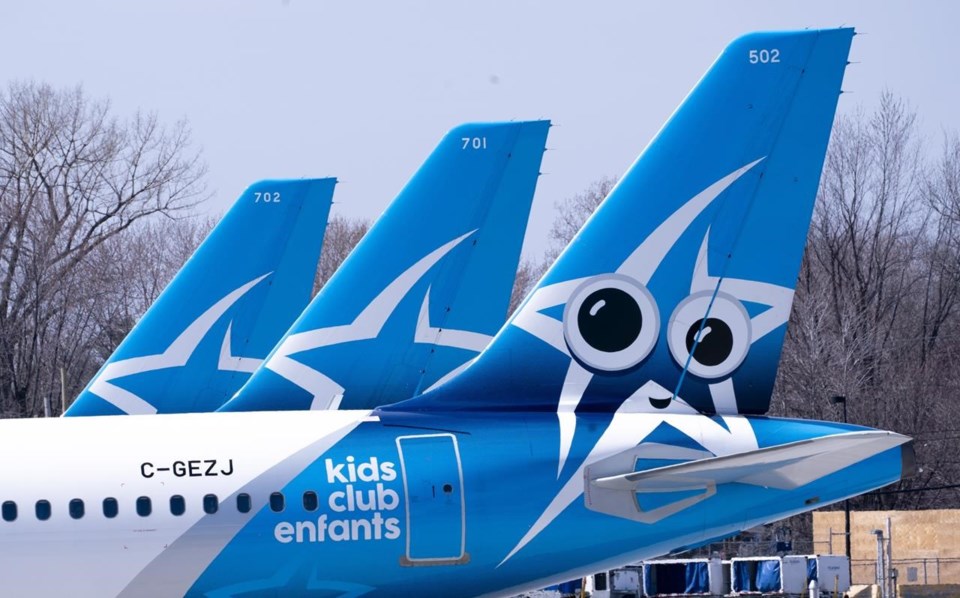MONTREAL — Transat A.T. Inc. has reined in summer growth plans as grounded planes continue to weigh on profit margins — after fears of a strike ate away at bookings last quarter, yielding a net loss, its CEO said.
"The persisting speculation of a strike by flight attendants starting last November clearly affected bookings and yield for the winter season," said chief executive Annick Guérard.
The Montreal-based tour operator's 2,100 flight attendants voted 99 per cent in favour of a strike mandate that month and twice rejected tentative deals before approving a new collective agreement in late February.
Guérard said bookings fell after the right-to-strike vote and the two deal rejections, and shot up again following each announcement of a tentative agreement — "so overall a clear correlation."
As a consequence, Air Transat's seat capacity ramp-up of 25 per cent in its first quarter exceeded its passenger increase of 20 per cent, resulting in slightly emptier planes en route to sun destinations.
Air Transat is also among the carriers facing serious knock-on effects from the recall of Pratt & Whitney turbofan jet engines for inspection and repair.
The cost of temporary plane leases prompted by those engine issues coupled with "heightened consumer price sensitivity ... as well as fierce competition" in the Toronto market put further pressure on profit margins, Guérard said.
Last year, Pratt & Whitney parent RTX Corp. said it would recall about 3,000 engines because parts were made with contaminated powdered metal that could cause cracking. Air Transat has grounded four jetliners as a result, and expects to remove one or two more from the skies before the year is out — 15 per cent of its 40-plane fleet.
The company has secured three Airbus A330 widebody aircraft leases to compensate, but they don't come cheap.
"Due to the operating challenges caused by the Pratt & Whitney engine situation as well as the problems affecting the Boeing 737 Max 9" — highlighted by the midflight blowout of a side panel in January — "a great number of carriers are looking for aircraft," Guérard noted.
"These issues combined with an already stressed supply chain are putting important pressures on the availability and the cost of aircraft leasing."
The tour operator's share price fell 27 cents or more than six per cent to close at $3.97 on the Toronto Stock Exchange on Thursday.
The grounded planes and high price tags on fresh leases drove the CEO's decision to scale back growth plans. Instead of bolstering seat capacity by 19 per cent this year, she opted instead for a more modest 13 per cent increase and scrapped some domestic and Canada-U.S. routes as a result.
"We have cancelled routes because of lack of aircraft," Guérard told analysts on a conference call. "We want to be cautious and make sure that we don't take too much risk for the upcoming year."
The company forecast that its adjusted operating income margin this year will be a within the lower end of the range laid out by management late last year, which was 7.5 per cent to nine per cent.
"Our early fare surveys suggest that pricing could be lower versus the exceptionally strong pricing all airlines enjoyed in summer 2023," said National Bank analyst Cameron Doerksen in a note to investors. He said industry capacity on Canada-Europe routes this summer will notch roughly 14 per cent higher year over year, suggesting stiffer competition.
Reasons for optimism remain, however.
"Overall travel demand still looks healthy, with Transat’s customer deposits for future travel up 14 per cent versus the same time a year ago," Doerksen said.
The first phase of Air Transat's joint venture with Porter Airlines will also kick off this summer, as the two carriers look to expand their range of destinations, tap into each other’s markets and provide a "solid alternative to AC (Air Canada) and WestJet," Guérard said.
Air Transat aims to benefit from access to Porter’s rapidly growing network in Canada and the United States. For Porter, the deal will open the gate to Europe and the sunny southern getaways currently being served by Air Transat.
Transat swung to a loss of $61 million in the three months ended Jan. 31, worse than the $56.6-million loss of the same period a year earlier. Transat has cleared a profit only twice in the past 17 quarters.
Revenue rose 18 per cent to $785.5 million in its first quarter from $667.5 million a year prior, the travel company said.
On an adjusted basis, Transat lost $2.11 per share compared with an adjusted loss of $1.62 per share a year ago. The result fell well below analysts' expectations of an adjusted loss of $1.22 per share, according to financial markets data firm Refinitiv.
Transat completed the $21-million sale of a hotel investment in Mexico last quarter, allowing the company to put the proceeds toward reducing its sizable debt, which stood at $665 million as of Jan. 31.
This report by The Canadian Press was first published March 14, 2023.
Companies in this story: (TSX:TRZ)
Christopher Reynolds, The Canadian Press



